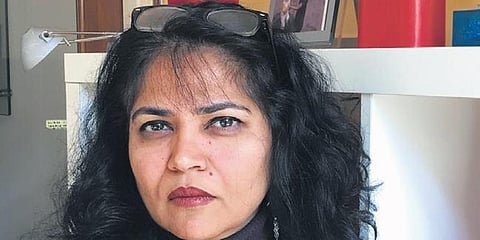

The air pollution in India killed 1.24 million people in 2017. The number rose to 1.67 million in 2019. While Delhi is gasping for clean air again, journalist-turned-environmentalist Jyoti Pande Lavakare is out with a book titled Breathing Here is Injurious to your Health.
Published by Hachette India, the book is set to launch next week. Lavakare has been working in the area of air pollution since 2013 and co-founded Care For Air in 2015.
She has worked with the Dow Jones Newswires and has penned columns on start-ups and entrepreneurship for The Business Standard, the New York Times, and Economic Times. An interview:
Give us a gist of your book.
It is about the human cost of air pollution. There is hardly any place in India that has pollution levels below the limit that the WHO recommends. About 70,000 scientific papers link air pollution to health hazards, but unfortunately awareness is very low. My book wants to create that awareness.
Could you share any interesting facts from and about the book?
I have interviewed almost 50 people for this book and drawn upon my experiences of spreading awareness among students, parents, doctors and residents of Delhi and other cities. It also has scientific facts, data, citations and exceptional case studies of pollution-triggered lung cancer victims.
Earlier, only smokers would get lung cancer. But in Delhi, we are all smokers. A new-born in Delhi is a smoker from its first breath. And children born in Delhi and other polluted areas have smaller lungs, lower lung function and irreversible lung damage as compared to the ones living in a cleaner environment.
Why did you feel the need to write it?
I discovered the ill-effects of air pollution in 2013-14, nearly four years after I moved back to New Delhi from California. I realised something was wrong in the winters as too many people fell ill. I got a terrible asthma attack during my first winter — something I had outgrown in childhood.
So, I decided to investigate. By 2014-15, I found other parents like me who were concerned at how the pollution was harming their children, and we formed a platform called Care for Air. But on the night of Diwali 2017, my mother was diagnosed with lung cancer.
We couldn’t do anything to save my mother, and she died within three months. I saw her suffer, suffocate, and struggle to breathe. By November 2018, I felt I had to write this book so that others realise how this killer is hiding in our own backyards.
Do you think Delhi is a good move for people shifting here in search of better jobs, with their older family members and kids?
I was born in Delhi. While I love my place of birth, I also hate it because of its pollution. The University of Chicago’s EPIC study has calculated that my mother could have lived 10 years longer, had she lived in an area where pollution levels were below WHO-recommended limits.
The book documents the flight of expats and Indians who left Delhi only because of the pollution. Dr Randeep Guleria from AIIMS, told me that he recommends many of his patients, especially the elderly, to leave Delhi in the winters.
Where do you think Delhi lags in maintaining clean air?
It is an ordinary problem that any leadership with real intention can easily solve if they follow the science and technology around it. If nothing is done, Delhi will soon become the cancer capital of India and the world.
The wealthy can protect themselves with air purifiers and N99 masks, but the poor are the most affected.the beginning,” finishes Kapur. rage of our products, which have a limited shelf life, as these are sans chemical preservatives and supplements…This is just the beginning,” finishes Kapur.